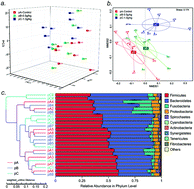Dietary lysozyme supplementation contributes to enhanced intestinal functions and gut microflora of piglets†
Abstract
Lysozyme plays a significant role in defense against bacterial pathogens and in regulating the interactions between gut microbiota and host immune systems. Here, the effects of dietary lysozyme on the intestinal development, immunity, and colonic microbiota of piglets were comprehensively evaluated. Twenty-four seven-day-old piglets from Landrace × Yorkshire sows (n = 8 per group) received no supplementation (group A, the control), 0.5 g kg−1 lysozyme (group B), or 1.0 g kg−1 lysozyme (group C). After the 14-day treatment, piglets supplemented with 1.0 g kg−1 lysozyme had higher average weaning weight, jejunal villus height (VH), and ileal lymphocyte counts than those in the control groups (P < 0.005). Serum total protein and albumin were significantly up-regulated (P < 0.005) and immunoglobulin G tended to increase in the 0.5 g kg−1 lysozyme group (P = 0.065). Bacteroidetes, Proteobacteria, and Fibrobacteres all showed a significant increase in relative abundance after lysozyme treatment at the highest dosage (P < 0.005). At the genus level, the relative abundance of Lactobacillus, Treponema_2, and Prevotellaceae_NK3B31_group was significantly increased in the lysozyme-treated groups. Furthermore, microbial genes related to glycerolipid, propanoate, and pyruvate metabolism showed much more abundance in the 1.0 g kg−1 lysozyme group. Interleukin-4 in the colonic mucosa was significantly up-regulated, while transforming growth factor-β1 showed significant reduction in the lysozyme-treated group. Moreover, mucosal catalase and malondialdehyde in colon samples increased significantly. These results demonstrate that dietary lysozyme efficaciously improves the development of intestinal structure and functions and promotes the enrichment of beneficial microbes in the gut microbiota in terms of both composition and metabolic functions.



 Please wait while we load your content...
Please wait while we load your content...